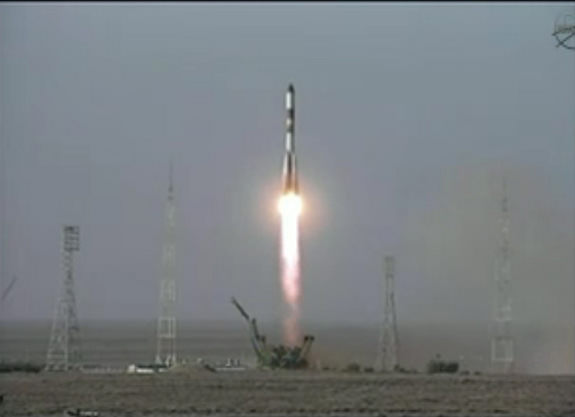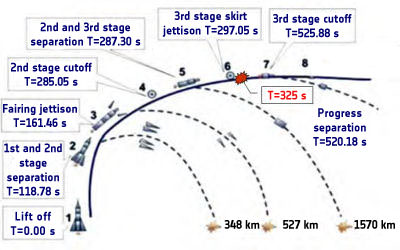The first launch of a Russian resupply ship since the August failure and crash of the Progress/SoyuzU is scheduled for Sunday, October 30, 2011 at 6:11 a.m. EDT (10:11 GMT). The importance of a successful launch looms large for the future of the International Space Station.
“Because the previous Progress didn’t get to orbit, it is important this launch go as planned,” NASA spokesman Kelly Humphries told Universe Today. “The booster we use to launch the crews, while not identical, is very similar to the one used for Progress — in particular the third stage where the failure was identified, so we do look forward to our Russian partners having a successful launch on Sunday.”
If not, the space station faces the prospect of being de-crewed.
This first post-shuttle era launch of a Progress cargo ship abruptly ended at about six minutes into the flight on August 24, 2011 when an engine anomaly prompted a computer to shutdown an engine, just before the third stage of the Soyuz rocket ignited. The rocket and ship crashed to Earth in eastern Russia.
Progress 45 is now set to launch from the Baikonur Cosmodrome in Kazakhstan on Sunday and hopefully deliver 2.8 tons of food, fuel and supplies to the space station crew members.

Progress M-12M cargo vehicle launches on August 24, 2011. The rocket eventually failed and the rocket and ship crashed. Credit: NASA TV.
If that launch goes as planned, that would allow the Soyuz TMA-22 spacecraft carrying three new station crew members to launch in mid-November. Flight Engineers Dan Burbank, Anton Shkaplerov and Anatoly Ivanishin are scheduled to join the current on-orbit crew of Commander Mike Fossum and Flight Engineers Satoshi Furukawa and Sergei Volkov on Nov. 16.
Fossum and his crew are due to end their stay at the station on Nov. 21, so if the Soyuz TMA-22 can’t launch before then, the ISS will be left crewless.
While the Soyuz rockets and Progress cargo ships have had a long history of successes, this one failure – coming just after the space shuttles were retired – has left the ability to get new crews to the space station in limbo. The Progress cargo ships launch on a Soyuz-U rocket, while the Soyuz crew capsules, — the Soyuz TMA — launches on a Soyuz-FG. The third stages of the two rockets are virtually identical.
A Russian commission investigating the Progress failure said the crash was caused by a malfunction in the rocket’s third stage engine gas generator. The commission the malfunction was the result of an accidental manufacturing flaw. The third stages of all Soyuz-type rockets have been changed out, and a Soyuz rocket did launch successfully on October 21 from the ESA’s new launch facility in French Guiana, carrying new GPS satellites.
The Soyuz-U rocket has had 745 successful launches and just 21 failures over nearly four decades. The Soyuz-FG has had 25 launches, all successful.
“Because of the failure and similarity of the launch vehicles, we have been performing a lot of preliminary planning and work to make sure that in the unlikely event the Progress were to have another problem,” Humphries said, “that we would be able to get the existing crew home safely and be able to operate the International Space Station and conduct research there without the crew on board.”
Humphries said the ISS team has identified many issues so that they would be capable of operating the space station almost indefinitely without a crew.
“Of course that is not the preference because it would have some impacts on our research,” he said. “But we are very confident that our Russian partners have done their due diligence and identified the root cause and taken the right steps to correct this and we are looking forward to having a good launch.”
Humphries said despite the challenges of working with potentially having to de-crew the ISS, the space station program and partnerships are still strong.
“The international partnerships we’ve developed with our colleagues in Russia, Canada, Japan and Euorpe are probably one the greatest achievements of the ISS program,” Humphries said. “We back each other up on a variety of operational and other fronts on a daily basis. For example, our Russian colleagues were instrumental in keeping the space station operational following the Columbia accident in 2003.”
The launch and also the Progress docking to the ISS will be carried live on NASA TV.
Source: Universe Today

No hay comentarios:
Publicar un comentario